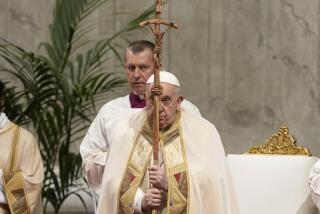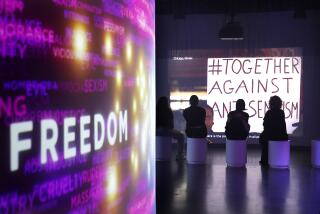Pope Meets With Jewish Leaders : Progress Reported; Joint Effort to Produce Holocaust Document Set
- Share via
CASTEL GANDOLFO, Italy — Pope John Paul II conducted unprecedented talks Tuesday with Jewish leaders at his summer home here, calming the storm in Catholic-Jewish relations that arose in June when he received President Kurt Waldheim of Austria.
Members of the papal delegation and the nine-member Jewish delegation reported significant progress after 75 minutes of “friendly, timely, positive and fruitful” discussions in the effort to resolve Jewish concerns about the Vatican position with respect to the Holocaust and anti-Semitism.
The most significant advance reported was a church commitment to prepare, with the assistance of Jewish scholars, what a joint statement issued later at Vatican City called “an official Catholic document on the Shoah (Holocaust),” including “the historical background of anti-Semitism and its contemporary manifestations.”
No Modern Precedent
The document will form a basis for church teaching throughout the world. The decision to have Jewish scholars assist the church in the drafting of the document has no modern precedent.
However, according to participants and to the joint statement, two issues of the greatest concern to many Jews were not resolved. They are the pontiff’s reception of Waldheim as a man of peace, despite accusations that Waldheim helped deport Jews to concentration camps during World War II, and the Vatican’s failure to grant diplomatic recognition to Israel.
“We agreed in our discussion to disagree agreeably,” quipped Rabbi Gilbert Klaperman, president of the Synagogue Council of America, who along with other members of the Jewish delegation emphasized the friendly and cooperative spirit of the meeting with the Pope and in the preparatory meetings Monday and early Tuesday with other Vatican officials.
‘Dismay and Concern’
The joint statement summarized the disagreement by saying: “The Jewish delegation expressed its dismay and concern over the moral problems raised for the Jewish people by the (Waldheim) audience. The Catholic delegation acknowledged the seriousness of and the church’s sensitivity to those Jewish concerns and set forth the serious reasons behind the judgment of the Holy See (to receive Waldheim on June 25).”
Waldheim has been accused of aiding the deportation of 40,000 Jews from Greece while he was a German army officer during World War II. He has denied deporting anyone to concentration camps, but the U.S. government, citing his war activities, has placed him on its “watch list” as an undesirable visitor.
Rabbi Marc H. Tanenbaum, director of international relations for the American Jewish Committee, said the Pope “listened carefully and patiently” to the delegation’s complaints but “did not respond concretely to the Waldheim question.”
Likewise, there was no agreement on the issue of diplomatic relations with Israel.
“He didn’t respond explicitly,” Tanenbaum said, “other than to speak the word ‘Israel’ with a certain affection. He was very careful and very circumspect about the Israel issue, and he did not move beyond where the church is today.”
Tanenbaum was asked if he believed that the results of the two days of talks with Vatican officials and the Pope had been enough to satisfy American Jews, who had threatened after the Waldheim affair to boycott the Pope’s visit to the United States this month. He replied: “I think so. I have no question that something very important has happened here. . . . There has been a new commitment by key actors in the Vatican.”
The Pope is scheduled to meet with 200 U.S. Jewish leaders in Miami on Sept. 11, the second day of his U.S. pastoral visit.
“I think the Pope will be received well in Miami,” said Seymour Reich, president of B’nai B’rith International.
Rabbi Mordecai Waxman, chairman of the International Jewish Committee for Interreligious Consultations and head of the delegation, described as significant a seemingly conciliatory statement authored by the Catholic delegation in the final statement concerning recognition of Israel. The statement said:
“The Jewish delegation expressed the concern of world Jewry at the absence of full diplomatic relations between the Holy See and the state of Israel. Representatives of the Holy See declared that there exist no theological reasons in Catholic doctrine that would inhibit such relations but noted that there do exist some serious and unresolved problems in the area.”
At a press conference at the Vatican after the papal meeting, Waxman drew attention to the church’s willingness to concede that there were no theological reasons barring recognition, although the statement did nothing to alter the Vatican position on the question.
The Holy See has never spelled out its reasons for withholding diplomatic recognition, but privately, officials say it will not do so until there is international agreement over the sovereignty of Israeli-occupied territory and Jerusalem is placed under some kind of international supervision that would include guaranteed access by people of all religions to their holy places.
The joint statement said the proposal for the document on the the Holocaust and anti-Semitism was made by Dutch Cardinal Johannes Willebrands, president of the Vatican Commission for Religious Relations With the Jews, who will supervise its preparation. Both sides said that no deadline was set for the document’s completion.
“What is historical is that there is going to be a Catholic document, but it is going to be prepared in consultation with our Jewish brothers,” said Bishop William H. Keeler of Harrisburg, Pa., chairman of the American Bishop’s Committee for Ecumenical and Interreligious Affairs, who participated in the discussions on the Vatican side.
Waxman said the Vatican’s willingness to state its position on the Holocaust and anti-Semitism clearly showed “a great sensitivity” to long-standing Jewish feelings that elements of the church have been insensitive to the uniqueness of Jewish extermination by the Nazis.
“The Pope was very responsive to the idea of a major document dealing with the Nazi Holocaust, the historic demonic forces that led to the breakout of the Holocaust and also to anti-Semitism and all the forces that come into it,” Tanenbaum said.
The joint statement said: “The Pope spoke (to the delegates) of his personal experience in Poland and his memories of living close to a Jewish community now destroyed. He recalled his recent spontaneous address to the Jewish community in Warsaw (in June), in which he spoke of the Jewish people as a force of conscience in the world today and of Jewish memory of the Shoah as a ‘warning, a witness and a silent cry’ to all humanity.”
The statement said the new church document “will contribute significantly to combatting attempts to revise and to deny the reality of Shoah and to trivialize its religious significance for Christians, Jews and humanity.”
The Jewish group also welcomed a second commitment from the Vatican to establish what the statement called “a special mechanism that would more closely follow trends and concerns within the world Jewish community and improve contacts and collaboration where the need arises.”
Mutual Concerns
Waxman, Tanenbaum and Keeler explained that the “mechanism” would include meetings of Jewish representatives “from time to time” with the Vatican secretary of state, currently Cardinal Agostino Casaroli, to discuss mutual concerns, such as the controversy over the Waldheim affair and of the Pope’s meeting in 1983 with Yasser Arafat, chairman of the Palestine Liberation Organization.
Tanenbaum said he had been told privately that during the controversial Arafat meeting “the Pope read the riot act.”
“Contrary to the popular impression,” Tanenbaum said, “I was told that the Pope told Arafat to stop killing Christians in Lebanon, told him to stop terrorism in the Middle East.”
He said the new mechanism would alert the Jewish community before such papal audiences occur and generally keep the Vatican informed about trends of feeling in the Jewish community.
“Our concern is how can we prevent such incidents in the future,” said Gerhart M. Riegner, the Swiss-based co-chairman of the governing board of the World Jewish Congress. “We agreed to organize certain structures, a mechanism for consultation regarding Jewish concerns throughout the world.”
Tanenbaum said the pontiff concluded their meeting with a remark that the Jewish delegation believed could have been meant as a reference to the Waldheim affair, the Holocaust and other grave contemporary problems. He quoted the Pope as saying, “There is a great deal of evil in the world, and the Lord and we have got to find a way to make good out of evil.”
The delegations met at noon in the 17th-Century papal palace. The representatives sat in a semicircle around the white-robed pontiff, who greeted them with the traditional Hebrew greeting “shalom,” which means peace. The meeting opened with the Jewish group reciting a psalm in Hebrew and the Catholics reciting another psalm in Latin. The talks were in English.
Participants in the meetings, in addition to Waxman, Riegner, Klaperman, Tanenbaum and Reich on the Jewish side, were Rabbi Alexander Schindler, president of the Union of American Hebrew Congregations; Geoffrey Wigoder of the Israel Interfaith Committee of Jerusalem; Rabbi Leon Klenicki of the Anti-Defamation League of B’nai B’rith, and Henry Siegman, executive director of the American Jewish Congress.
The church delegation, led by Willebrands, included Father Pierre Duprey and Father Pier Francesco Fumagalli of the Vatican’s Commission for Religious Relations with the Jews; Keeler; Msgr. Luigi Gatti of the Vatican’s Council for Public Affairs; Eugene Fisher of the Secretariat for Catholic-Jewish Relations of the American bishops’ conference; the Rev. Jorge M. Mejia of the Pontifical Commission for Justice and Peace, and Msgr. John A. Radano and Msgr. Eric Salzmann of the Secretariat for Promoting Christian Unity.
More to Read
Sign up for Essential California
The most important California stories and recommendations in your inbox every morning.
You may occasionally receive promotional content from the Los Angeles Times.













